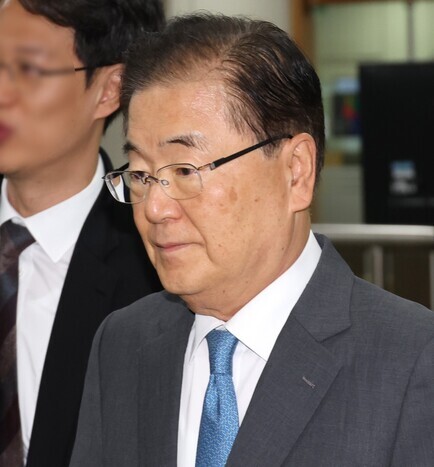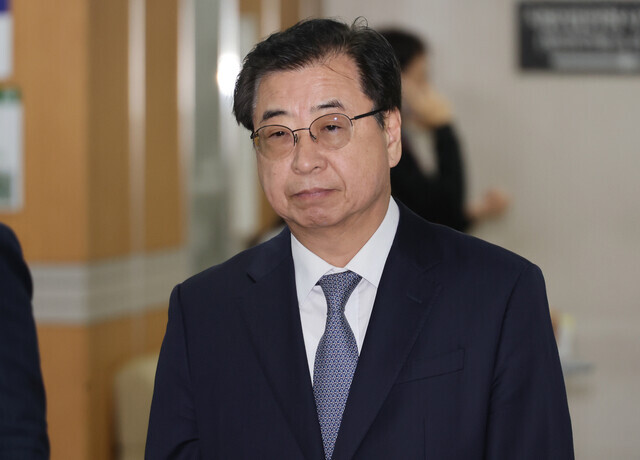hankyoreh
Links to other country sites 다른 나라 사이트 링크
Hearing starts in contentious case of 2019 return of N. Korean fishers

Former director of national security Chung Eui-yong and other members of the Moon Jae-in administration’s national security lineup appeared in court on Wednesday for a first trial on charges of forcibly repatriating North Korean fishers who had declared their intent to defect.
Chung and the other defendants denied all the charges, saying the incident was not a matter of forcibly repatriating defecting North Korean fishers but one of “arresting criminals who had crossed over without authorization.”
The big question in the trial appears likely to be whether North Korean residents can be viewed as citizens of the Republic of Korea.
During the hearing, one of the prosecutors who was talking about the North Korean crew members briefly appeared to become too overcome with emotion to continue speaking.
On Wednesday, a first hearing was held in criminal division 21-1 of the Seoul Central District Court under judge Heo Gyeong-mu for defendants charged with abuse of official authority in violation of the National Intelligence Service Act.
These members of the Moon administration’s national security lineup included Chung as well as Suh Hoon, the former National Intelligence Service director; Noh Young-min, the former presidential chief of staff; and former Minister of Unification Kim Yeon-chul.
They are charged with unlawfully sending back to North Korea two North Korean fishers who declared their intent to defect after killing 16 of their fellow crew members in November 2019, as well as with ordering related government employees to perform actions that were not within the scope of their duties.
They were further charged with preventing the North Korean crew members who had announced their intent to defect from exercising their “right as citizens of the Republic of Korea” to face investigation and trial according to the Constitution and law.
The defendants denied all the charges. While they acknowledged that the North Korean seamen were repatriated, they maintained that the decision was not in violation of the law.
“To begin, I can’t agree with the [prosecution’s] characterization of this as a ‘forced repatriation of North Korean fishers,’” Chung said.
“This was a case in which the South Korean Navy subdued and seized criminals who had illegally crossed the [Military Demarcation Line] while fleeing after committing a heinous crime in North Korea,” he explained.

Chung’s attorney also asked, “While [the North Koreans] might have been tried and sentenced to death in South Korea, why has the prosecution not considered the possibility that they could be acquitted and roam free?”
At the time of the repatriation, some skeptics did indeed question the practical possibility of carrying out an investigation without having access to the bodies.
The key question at the trial appears likely to be whether all North Koreans can be viewed as citizens of the Republic of Korea.
In pursuing their indictment, prosecutors operated on the premise that according to Article 3 of the Republic of Korea Constitution — which states that the entire Korean Peninsula, including North Korea, is also South Korean territory — North Koreans automatically become citizens of the Republic of Korea when they enter its territory and express their intent to defect.
Chung’s attorney argued, “The logic that interprets [all] North Korean citizens as citizens of the Republic of Korea in every circumstance is the logic of right-wing national security groups who seek to turn the constitutional order of pursuing peaceful reunification amid a divided state at war into a situation of antagonism.”
They also said the indictment should be “thrown out as a ‘willy-nilly indictment’ reflecting the current administration’s aims of abolishing the previous administration’s peaceful inter-Korean policies and revising Cold War-era security policies.”
Other questions that are expected to be addressed in the trial include whether security decisions relating to inter-Korean relations can be punished according to the standards of criminal law and whether it is possible to punish criminals in South Korea for crimes committed in the North.
During opening remarks at the hearing Wednesday, one of the prosecutors appeared to become too overcome with emotion to continue speaking.
“Nothing is yet known about what punishment these defecting North Korean fishers faced after being forcibly repatriated,” they said.
“It is believed that they are no longer alive. [The Republic of Korea] is a party to the UN Convention against Torture and a state where the death penalty is effectively abolished, and we can only ask whether it was justified for them to bind [the North Koreans] with cable ties and forcibly repatriated them,” they tearfully added.
In response, the judge cautioned the prosecutor to “look at the bench while speaking, not at the gallery.”
By Lee Ji-hye, staff reporter
Please direct questions or comments to [english@hani.co.kr]

Editorial・opinion
![[Column] How tragedy pervades weak links in Korean labor [Column] How tragedy pervades weak links in Korean labor](https://flexible.img.hani.co.kr/flexible/normal/500/300/imgdb/original/2024/0703/8717199957128458.jpg) [Column] How tragedy pervades weak links in Korean labor
[Column] How tragedy pervades weak links in Korean labor![[Column] How opposing war became a far-right policy [Column] How opposing war became a far-right policy](https://flexible.img.hani.co.kr/flexible/normal/500/300/imgdb/original/2024/0702/5017199091002075.jpg) [Column] How opposing war became a far-right policy
[Column] How opposing war became a far-right policy- [Editorial] Korea needs to adjust diplomatic course in preparation for a Trump comeback
- [Editorial] Silence won’t save Yoon
- [Column] The miscalculations that started the Korean War mustn’t be repeated
- [Correspondent’s column] China-Europe relations tested once more by EV war
- [Correspondent’s column] Who really created the new ‘axis of evil’?
- [Editorial] Exploiting foreign domestic workers won’t solve Korea’s birth rate problem
- [Column] Kim and Putin’s new world order
- [Editorial] Workplace hazards can be prevented — why weren’t they this time?
Most viewed articles
- 110 days of torture: Korean mental patient’s restraints only removed after death
- 2In the blink of an eye, an unthinkable crash turned a night out into a nightmare
- 3Experts cast doubt on driver’s claim that sudden unintended acceleration caused deadly crash
- 4[Column] How tragedy pervades weak links in Korean labor
- 5Families, friends mourn loved ones cut down in prime in deadly car crash
- 6Democrats seek to impeach 4 prosecutors, including those tied to probes into Lee Jae-myung
- 7[Column] How opposing war became a far-right policy
- 81 in 10 marriages in Korea last year was with a foreign national
- 9KCC chief resigns to avoid impeachment, the second in 7 months
- 10Japan is building a military meant for more than self-defense — and has the US to thank for it